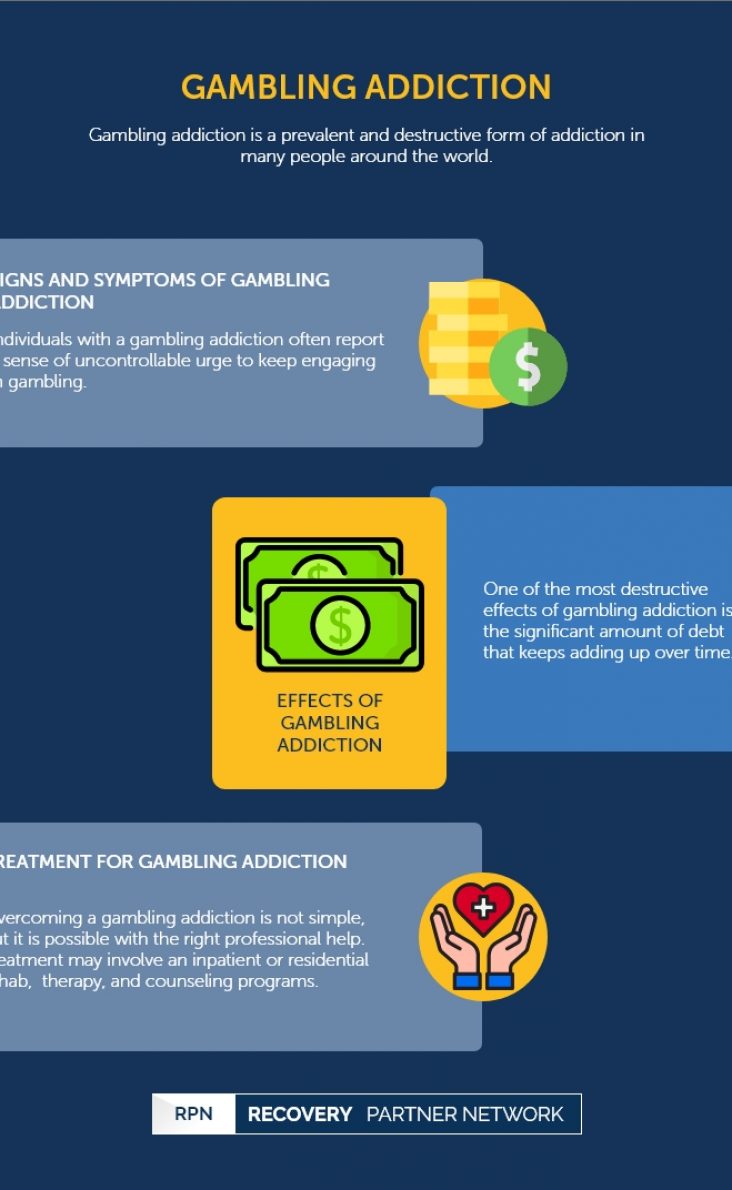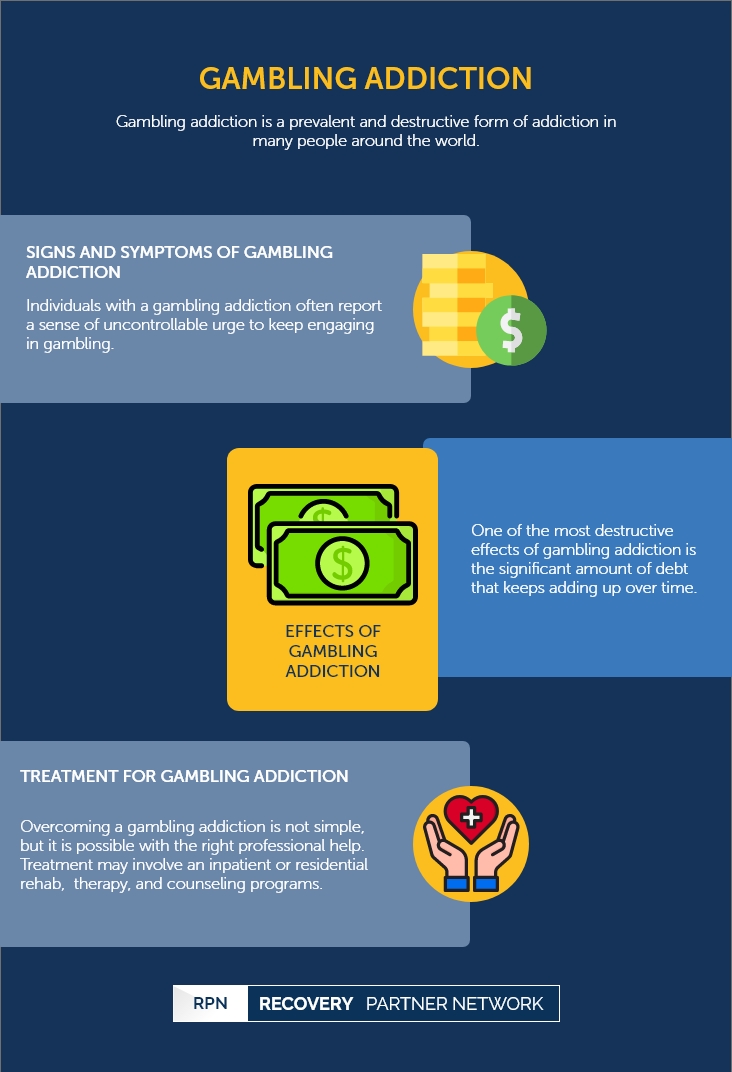Gambling addiction is a prevalent and destructive form of addiction in many people around the world.
Gambling Addiction
Gambling addiction | Table of Contents
What is a Gambling Addiction?
It is reported that around two million individuals around the country have an addiction to gambling. For around 20 million individuals, this habit significantly interferes and impacts their work and personal life. The definition of gambling is when a person risks something of particular value in the hopes of getting something of more significance. The definition of gambling addiction is when an individual starts developing an uncontrollable desire to continue to take part in gambling even when it affects his/her life. Gambling stimulates the brain’s reward system. A phenomenon very similar to that of alcohol or drugs, making gambling just as addictive as any other substance of abuse. Gambling addiction is currently considered to be the most common impulse control disorder around the world.
Many factors contribute to the formation of an addiction to gambling in an individual. These factors include being desperate for money, the feelings of euphoria that comes from the thrill of betting, and the intoxicating, exciting atmosphere of the gambling setting.
In the past, gambling was regarded as a compulsion rather than an addiction by the psychiatric community. A compulsion is a behavior that is mostly motivated and pushed by a strong urge/desire rather than a physical requirement. However, the American Psychiatric Association decided to officially identify and recognize gambling as an addiction in the 5th edition of the Diagnostic and Statistical Manual of Mental Disorders (DSM) in 2013, after studies showed that gambling addiction is similar to drug addiction and alcoholism than what was initially perceived.
FAQ
- What causes a gambling addiction?
- How can you tell if someone has a gambling problem?
- How does gambling affect families?
Factors such as personality disorders, substance abuse, anxiety, and depression are often associated with compulsive gambling.
A few noticeable changes can be detected in the behavior and mood of an individual who develops a gambling problem, such as a decrease in performance at work, being withdrawn from family and friends, reporting distressing feelings such as hopelessness, depression or suicidal thoughts.
The three most common negative impacts gambling has on families are financial pressures, impaired relationships, lack of trust, and other emotional troubles. The children of parents with gambling issues are at a higher risk of developing gambling problems themselves in the future.
How Gambling Affects the Brain
As with addictive substances like cocaine and meth, gambling addiction also releases dopamine within the brain.
It is reported that addictive substances affect the reward system of the brain and release up to ten times more dopamine than the usual amount. The continuous use of these drugs pushes the body to form a tolerance towards these substances as the natural production of dopamine is inhibited, and the body requires a more significant amount of drugs to generate the required effect.
Similar to individuals who are suffering from substance use disorders require significantly strong hits to reach the desired state of euphoria or significantly larger amounts of alcohol to get drunk, individuals who are addicted to gambling pursue riskier opportunities and bet significantly larger amounts of money to achieve the pleasure they once did. In addition to this, studies show that pathological gamblers and drug users have many similar genetic predispositions for reward-seeking and impulsivity. Individuals who are suffering from both substance abuse problems and compulsive gambling experience symptoms of withdrawal when they try to quit.
FAQ
- What does gambling do to your brain?
- Is gambling addiction a mental illness?
- Does gambling cause depression?
Studies have shown that gambling releases dopamine in brain areas similar to that of an individual who abuses drugs. Therefore continuous exposure to gambling may result in long-lasting changes to brain chemistry.
Pathological gambling is regarded as a severe form of mental illness. In certain situations, it is the cause, and in others, it is the result of untreated mental illness.
Individuals who gamble compulsively are twice as prone to be depressed and suffer from psychological distress.
Signs and Symptoms of Gambling Addiction
The critical element of gambling addiction is that individuals become very much involved in gambling activities and later compulsively pursue them disregarding the potential adverse consequences it may bring. Individuals struggling with a gambling addiction often report a sense of uncontrollable urge in which they believe they are unable to avoid or quit gambling.
Mentioned below are some common signs of gambling addiction :
- Having an obsessive preoccupation with gambling.
- Having the desire to gamble with increasing amounts of money just to reach the same level of euphoria.
- Unable to control, reduce, or quit gambling.
- Feeling restless or irritable when unable to gamble.
- Gambling to run away from issues or feelings of guilt, helplessness, depression, or anxiety.
- Attempting to recover lost money by gambling more.
- Jeopardizing or losing essential relationships or school/work opportunities due to gambling.
- Resorting to theft/fraud to receive money for gambling.
Unlike individuals who causally gamble, those who are addicted to gambling cannot merely stop or walk away when losing or set a loss limit. These individuals feel compelled to continue gambling in the hopes of recovering their money. In most cases, the individual loses more than he/she intended, followed by a sense of regret for losing the money, and then proceeds to recover the loss by gambling further. This pattern eventually leads to a more significant loss. This destructive cycle leads to many adverse consequences and can severely impact one’s physical, emotional, mental, and financial health.
Effects of Gambling Addiction
One of the most dangerous effects of being addicted to gambling is the significant debt that keeps adding up over time. It is reported that the average amount of debt of a gambling addict carries between $40,000 to $70,000. It is common for gambling addicts to lose their job as they regularly miss work or neglect responsibilities to spend time gambling. This phenomenon results in problem gamblers getting involved in illegal activities such as fraud or theft to collect funds to continue their habit of gambling. Individuals who cannot pay off their debts end up declaring bankruptcy and even losing their homes.
These factors result in financial stress, which ultimately places an enormous burden on both the family and the addict. Many relationships within the family are broken as a result of gambling addiction. Children often end up being the innocent victims of the emotional turmoil that is created within the home because of this addiction. In addition to these effects, individuals struggling with a gambling addiction also tend to develop physical health issues, which include ulcers, stomach problems, headaches, and insomnia due to high levels of stress. Individuals who suffer from problematic gambling issues have high chances of abusing drugs and alcohol. This condition can lead to more harmful and dangerous effects.
Self-Help for Gambling Addiction
The most crucial step in overcoming an addiction to gambling is realizing that one has a problem. It takes a lot of strength and courage to accept and take responsibility, especially when one has lost a lot of money and strained/broken relationships along the way. Don’t lose hope, and do not try to overcome this addiction on your own. With the right treatment and help, many have successfully overcome this destructive habit and reclaimed their lives.
- Learn to Experience Unpleasant Feelings in Healthier Ways
- Strengthen Your Support Network
- Join a Peer Support Group
- Seek Help for Underlying Mood Disorders
If one gambles when he/she is bored or after a tiring day at work or after a big argument with one’s spouse, then gambling may be a manner of self-soothing unpleasant feelings or an excuse to unwind, relax and socialize. However, there are much healthier and more impactful options available for managing one’s moods and getting rid of boredom. These include exercising, spending time with friends who don’t get involved in gambling, picking up new hobbies, or practicing relaxation skills.
It is difficult to fight any addiction without support. Therefore it is advised to reach out to family and friends. If one’s support network is limited, there are many ways to make new friends and get the support you need without visiting casinos or gambling online. One can reach out to colleagues at work, join a sports team or even a book club, enroll in an educational class, or volunteer for a good cause.
12-step programs and groups such as Gambler’s anonymous are useful and can be of great help as they provide judgment-free support. A vital part of the program is finding a sponsor, a former gambler who has been in the same situation and now has overcome the addiction and hence able to provide you with essential guidance and support.
Mood disorders like depression, substance abuse, stress, or anxiety can trigger and develop gambling issues. Even when one has overcome gambling addiction, these underlying problems may remain. Therefore it is strongly advised to identify and address them.
FAQ
- Can gambling addiction be cured?
- How do I stop my gambling addiction?
- Can you stop gambling on your own?
Although there is no cure for gambling addiction, there are steps that can be taken to mitigate the damage caused by this addiction and control and manage the urges.
A few effective ways of overcoming gambling addiction include managing stress and identifying triggers, finding new hobbies that do not include any form of gambling, and planning ahead to avoid boredom.
The initiative and the decision to quit gambling has to be made by the individual who is suffering from the problem. However, the chances of an effective and successful recovery increase when an individual receives addiction treatment and support from friends and family.
Treatment for Gambling Addiction
Overcoming a gambling addiction is not simple, and seeking out professional help doesn’t mean one is weak or cannot handle problems. However, it is important to remember that every person is unique. Therefore one needs a recovery program that is tailored specifically to one’s condition and requirements. It is advised to talk to a doctor or a medical health professional about different treatment options, which include:
- Inpatient or Residential Treatment and Rehab Programs
- Treatment for Underlying Conditions
- Cognitive-Behavioral Therapy
- Family Therapy and Marriage, Career, and Credit Counseling
These centers are aimed at individuals with severe gambling addictions who find it challenging to avoid gambling without round the clock medical support.
Underlying conditions and factors contribute to one’s compulsive gambling, including substance abuse or mental health issues, which include anxiety, COD, depression, or ADHD. The treatment for this could include therapy, medication, and changes in lifestyle. Problem gambling may even be a symptom of bipolar disorder. Therefore one’s doctor/therapist may have to rule this out before making a diagnosis.
Cognitive-behavioral therapy for gambling addiction focuses explicitly on changing unhealthy gambling behaviors and thoughts, such as false beliefs and rationalizations. This form of treatment can teach an individual how to fight and overcome urges to gamble while also solving financial, work, and relationship issues that have been caused by this addiction. Therapy can give you the tools and methods to cope with your addiction as most addictions last a lifetime.
These forms of therapy can help one work through specific problems that have been created by one’s addiction to gambling. They can help lay the foundation for repairing and restoring one’s relationship and finances.
Recovery Partner Network
We aim to educate and empower. If you feel our library of resources does not cover your specific need, reach out to us, and we would be happy to help.
STATISTICS
© Copyright 2026


